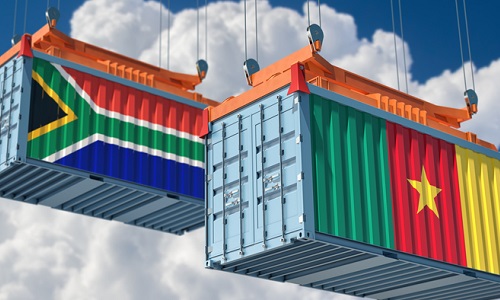Sign up for our free daily newsletter
YOUR PRIVACY - PLEASE READ CAREFULLY DATA PROTECTION STATEMENT
Below we explain how we will communicate with you. We set out how we use your data in our Privacy Policy.
Global City Media, and its associated brands will use the lawful basis of legitimate interests to use
the
contact details you have supplied to contact you regarding our publications, events, training,
reader
research, and other relevant information. We will always give you the option to opt out of our
marketing.
By clicking submit, you confirm that you understand and accept the Terms & Conditions and Privacy Policy
Africa harbours excellent potential for intra-continental trade, given the rapid growth that its economies are experiencing.
While that is true, the African trade landscape still presents many barriers for investors. In some African countries, these barriers are related to issues such as lack of infrastructure, low communication between nations, border and national security concerns, and illegal immigration. Moreover, until recently, the lack of an overarching agreement, such as the African Continental Free Trade Area (AfCFTA), was also a significant obstacle for intracontinental trade. Hence, the AfCFTA can be a catalyst in the promotion of trade in Africa.
The AfCFTA has four main goals:
- The unification of the entire African market for goods and services, with free movement of businesspersons and investments and consequently, accelerate the establishment of the Continental Customs Union.
- The expansion of trade in Africa, through better harmonisation and coordination of trade liberalisation and facilitation.
- Addressing the challenges of multiple and overlapping memberships to different regional economic areas and accelerate the regional and continental integration processes.
- The improvement of competitiveness at the industry and enterprise level by exploiting opportunities for scale production, continental market access, and better reallocation of resources.
The implementation of the AfCFTA is extremely pertinent considering the current context of international trade, which nowadays is heavily influenced by globalisation, easy access to new markets and constant mobility.
The elimination of the geographical frontiers of the African nations through the removal of trade frontiers is a quasi-mandatory requirement to improve trade in Africa. The AfCFTA will play a central role in the development of intracontinental trade in Africa, allowing the improvement of trade among African nations, creating stronger economic ties between the countries, and fostering regional peace.
Ratification by member states
As of January 2022, 41 of the 54 states that are signatories of the AfCFTA have ratified the Agreement. The countries that have already ratified the AfCFTA are Ghana, Kenya, Rwanda, Niger, Chad, Eswatini, Guinea, Côte d’Ivoire, Mali, Namibia, South Africa, Congo Rep., Djibouti, Mauritania, Uganda, Senegal, Togo, Egypt, Ethiopia, Gambia, Sahrawi Arab Democratic Rep., Sierra Leone, Zimbabwe, Burkina Faso, São Tomé & Príncipe, Equatorial Guinea, Gabon, Mauritius, Central African Rep., Angola, Lesotho, Tunisia, Cameroon, Nigeria, Malawi, Zambia, Algeria, Burundi, Seychelles, Tanzania, and Cabo Verde.
Certainly, it is only a matter of time until the AfCFTA is fully ratified by all the African States.
Current and future challenges
Although Africa has great economic potential, it presents many challenges due to its trade conditions. These challenges are often due to the absence of the necessary infrastructure, such as roads and maritime ports that meet international standards. For example, many regions of the continent have no roads to transport the goods they produce to neighbouring countries or even to other parts of their own country. Another challenge for trade is the lack of telecommunication or Internet connection and the high costs of these services in large parts of the continent.
Furthermore, there are also challenges related to national security, given that some African nations still face internal and regional conflicts. Consequently, these conflicts hinder trade in the areas of the countries where the conflicts take place. These conflicts also slow trade in the country, increasing operational cost or disincentivising foreign investments.
For successful implementation of the AfCFTA, it will be necessary that African nations address or mitigate the challenges they are currently facing. It is paramount that the obstacles that caused the lack of a single market for goods and services on the continent be eliminated. Further, it will also be necessary to create more stable movement of capital and persons.
Benefits for the Continent
The benefits of the AfCFTA are immense. Considering the implementation of the objectives established by the AfCFTA, its successful application will bring about the following benefits, among others:
- Creation of a single market for goods and services, facilitated by the free movement of persons.
- Deepening economic integration of the African continent.
- Creation of a liberalised market for goods and services through successive rounds of negotiations.
- Contributing to the movement of capital and natural persons and facilitating investment.
- Creation of the foundation for the establishment of a Continental Customs Union at a later stage.
- Promoting and attaining sustainable and inclusive socio-economic development, gender equality and structural transformation of the State Parties.
- Enhancing the competitiveness of the economies of State Parties within the continent and the global market.
- Promoting industrial development through diversification and regional value chain development, agricultural development, and food security.
Given the number of countries that are signatories to it, the AfCFTA constitutes one of the major trade agreements of its nature.
Thus, it will undoubtedly take some time until the African nations realise the full potential and objectives of the AfCFTA. However, the level of commitment and efforts made by African countries to ratify such an important document is a strong indication of Africa’s eagerness to be a significant player in world trade through the improvement of its intracontinental trade.
Clarence Abogados & Asociados is based in Malabo, Equatorial Guinea

Email your news and story ideas to: [email protected]





.jpg)

